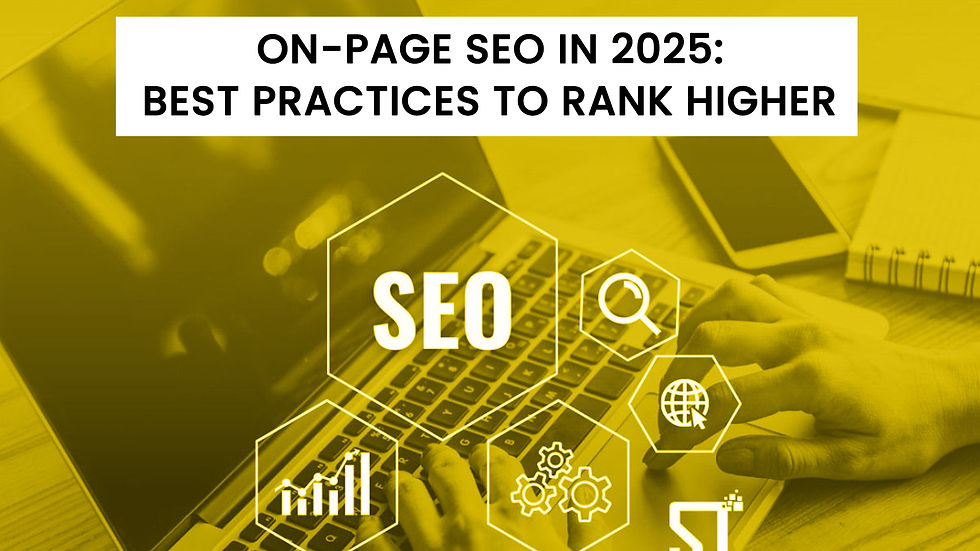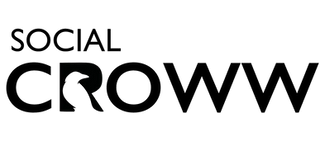On-Page SEO in 2025: Best practices to rank higher
- Sachin Singh
- Jun 17, 2025
- 4 min read
Updated: Jul 20, 2025

On-Page SEO in 2025 will no longer be about adding meta tags or stuffing keywords. Search engines are becoming smarter, and the competition is increasing. It's all about providing high value, intent-driven that is backed up by technical precision and accessibility.
This blog will break down the newest trends, best practices and actionable tips for mastering on page SEO in 2025.
Also Read: What is Keyword Research?
What is on-page SEO?
On-page SEO, also known as on-site search engine optimization (SEO), is the optimization of content and HTML elements within a website in order to increase its visibility. This includes headings, Meta tags, internal links and content structure.
Why on-page SEO still matters in 2025
On-page SEO is still a foundation that's critical for ranking. Google's algorithms such as Hummingbird BERT and MUM place a high emphasis on the relevance of content, its structure and user satisfaction.
Why it is essential for 2025
Search engines favor context-rich, well-structured pages
How user signals like dwell time and bounce rate impact rankings
AI generated content still needs human editing
Experience, Expertise and Authoritativeness (E-E-A.T) are more important than ever
The Core Elements of SEO on-page in 2025
Here are the top on-page SEO elements you should optimize for in 2025.
1. Search Intent Alignment
Google now understands user intent more than ever. You must provide content that directly answers what users are looking for, regardless of whether they're searching for navigational, informational or commercial.
Tip : Map out keyword intent using Google Search console and AlsoAsked.
2. Structured and Optimized Content
Use in its natural language, not as a keyword-stuffing.
Structure content using H1, H2, H3 properly
Keep paragraphs and sentences short.
For longer blogs, add a table of contents
By 2025, Google will use AI to evaluate readability and coherence - so now clarity and flow are ranking factors.
3. Meta Tags and Titles are still Important
Title tags - Keep it to 60 characters and include the target keyword.
Meta description: 150-160 characters. Make them compelling to increase CTR
Add the meta robots tags for control indexation
Pro tip: Use dynamic titles templates for product or category pages to automate the optimization.
4. URL Structure
Clean, readable URLs still perform best:
Avoid long strings or parameters. shorter is better .
5. Internal Linking Strategy
Links to relevant blog posts and product pages
Use descriptive text instead of "click here"
Limit the number of outbound links that can be placed on a page
Search engine crawlers and users can both benefit from internal links, which improve session time.
6. Image SEO with AI in mind
Compress images without losing quality
Use alternative text and descriptive file name
Use WebP and AVIF formats to speed up loading
Enhance visual search rankings by using image schema
Optimizing images has become essential with Google Lens, visual AI search and other technologies gaining popularity.
7. Core Web Vitals and UX
Google's algorithm 2025 now incorporates metrics for user experience into ranking.
LCP (Largest Contentful Paint): Fast loading time
CLS (Cumulative Layout Shift): Visual stability
INP: (Interaction with Next Paint) - Responsiveness of clicks
Make sure that your website is responsive, mobile-first and lightweight.
8. Structured Data & Schema Markup
Use JSON LD schema for your snippets to improve their SERPs. Use:
Blog article schema
Product schema for eCommerce
Extra visibility with FAQ schema
Breadcrumb schema for better navigation
Rich snippets have the potential to boost CTR, SEO authority and .
9. Topical Authority and EEAT Signals
Trust signals are more important than ever with AI-generated content on the internet.
Include bios of authors with credentials
Add case studies or testimonials
External sources of information that are credible
Keep the content fact checked and updated
Google gives more weight to originality and experience, than just keyword matching.
Also Read: Types of SEO
Bonus tip: Don't ignore voice search
Optimizing for conversational searches will become increasingly important as smart speakers and mobile assistants become more common.
Use long-tail keywords and question-based keywords
Answer in natural language (good for featured snippets).
If local queries are relevant, focus on them
Final Thoughts on the Future of On-Page Search Engine Optimization
In 2025, on-page SEO is more than a checklist. It's about creating experiences with high value that humans and search engine trust.
You can improve your ranking and increase engagement by focusing on quality content technical precision and design centered around the user.
Quick on-page SEO Checklist for 2025
Use of heading tags and a clear URL structure. Internal links to content that is relevant. Optimized images using alt text. Fast, mobile-friendly experiences. Structured data/schema marksup. Original, up-to-date content. Aligned with the user's intent.
Clear page title with primary keyword
Compelling meta description
Proper use of heading tags
Clean URL structure
Internal links to relevant content
Optimized images with alt text
Fast, mobile-friendly experience
Structured data/schema markup
Up-to-date, original content
Aligned with user intent




Comments